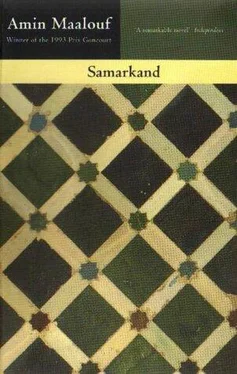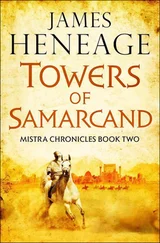It was the second wave of Mongol invasions which swept over Alamut. It was a little less bloody, but more far-reaching. How can we not share the terror of the people alive at the time, knowing that the Mongol troops were able, over a period of a few months, to lay waste to Baghdad, Damascus, Cracow in Poland and the Chinese province of Szechuan.
The Assassin’s fortress thus opted to surrender, the fortress which had resisted so many invaders over a hundred and sixty-six years! Prince Hulagu, grandson of Chengiz Khan, came in person to admire this masterpiece of military construction; legend says that he found provisions which had been conserved intact from the days of Hassan Sabbah.
After inspecting the place with his lieutenants, he ordered the soldiers to destroy everything, not to leave a stone untouched, not to spare even the library. However, before setting fire to it, he permitted a thirty-year-old historian, a certain Juvayni, to go inside. He had been in the process of writing a History of the Conqueror of the World at Hulagu’s request, which book is still today our most valuable source on the Mongol invasions. He thus was able to go into this mysterious place where tens of thousands of manuscripts were kept in rows, stacked up or rolled up; outside he was awaited by a Mongol officer and a soldier with a wheelbarrow. What the wheelbarrow could hold would be saved, the rest was to be victim to the flames. There was no question of reading the texts or cataloguing the titles.
A fervent Sunni, Juvayni told himself that his first task was to save the World of God from the fire. He started to pile up as quickly as he could any copies of the Quran, recognizable by their thick binding and stored in the same place. He had a good score of them and made three trips to carry them out to the wheelbarrow which was already almost full. Now, what to chose? Heading toward one of the walls, against which the volumes seemed to be better ordered than elsewhere, he came across innumerable works written by Hassan Sabbah during his thirty years of voluntary reclusion. He chose to save one of them, an autobiography of which he would quote some fragments in his own work. He also found a chronicle of Alamut which was recent and apparently well documented and which related in detail the history of the Redeemer. He hurried to take it away with him, since that episode was totally unknown outside the Ismaili community.
Did the historian know of the existence of the Samarkand Manuscript? It seemed not. Would he have looked for it if he had heard it spoken of, and having thumbed through it, would he have saved it? We do not know. What is told is that he stopped in front of a group of works devoted to the occult science and that he delved into them, forgetting the time. The Mongol officer who came to remind him with a few words had his body covered with thick red-framed armour and had as head protection a helmet which broadened out like long hair toward the neck. He was carrying a torch in his hand and to show just how much in a hurry he was, he placed it next to a pile of dusty scrolls. The historian gave in and gathered into his hands and up to his armpits as many as he could grab, and when the manuscript entitled Eternal Secrets of Stars and Numbers fell to the ground, he did not bend over to pick it up again.
Thus it was that the Assassins’ library burnt for seven days and seven nights, causing the loss of innumerable works, of which there was no copy remaining and which are supposed to have contained the best-guarded secrets in the universe.
For a long time it was believed that the Samarkand Manuscript had also been consumed in the inferno of Alamut.
BOOK THREE. THE END OF THE MILLENNIUM
Arise, we have eternity for sleeping!
OMAR KHAYYAM
Until now I have spoken little of myself. I have been trying to expose, as faithfully as possible, what the Samarkand Manuscript reveals of Khayyam and of those he knew and some of the events he witnessed. It remains to be told just how this work, spared at the time of the Mongols, has come down to our time, and through what adventures I managed to gain possession of it, and to start with — through what stroke of luck I learnt of its existence.
I have already mentioned my name, Benjamin O. Lesage. In spite of its French sound, the heritage of a Huguenot forebear who emigrated in Louis XIV’s century, I am an American citizen and a native of Annapolis in Maryland on the Chesapeake Bay, a modest inlet of the Atlantic. My connection with France is not limited, however, to that distant forefather and my father applied himself to renewing the link. He had always had an obsession about his origins — even noting in his school book: ‘Was my genealogical tree felled in order to construct a get-away boat!’, and he set about learning French. Then, with pomp and circumstance, he crossed the Atlantic in the opposite direction to the hands of time.
His year of pilgrimage was either extremely badly or well chosen. He left New York on 9 July 1870, on board the Scotia; he reached Cherbourg on the 18th and was in Paris on the evening of the 19th with war having been declared at mid-day. There followed retreat, calamity, invasion, famine, the Commune and massacres. My father was never to live a more intense year. It would remain his finest memory, why should it be denied? There is a perverse joy in finding oneself in a besieged city where barricades fall as others arise and men and women rediscover the joys of primitive bonding. How many times in Annapolis, around the inevitable holiday turkey, would father and mother recall with emotion the piece of elephant trunk they had shared on New Year’s eve in Paris and which they had bought for forty francs a pound at Roos’, the English butcher on Boulevard Haussmann!
They had just become engaged, they were to be married a year later, and the war christened their happiness. ‘Upon my arrival in Paris,’ my father would recall, ‘I took up the habit of going to Cafe Riche in the morning, on the Boulevard des Italiens. With a pile of newspapers, le Temps, le Gaulois, le Figaro, la Presse , I would settle down at a table, reading every line and listing discreetly in a notebook the words I could not understand — words such as “gaiter” or “moblot” — so that I would be able, upon my return to my hotel, to ask the erudite concierge.
‘The third day a man with a grey moustache came and sat at the next table. He had his own stack of newspapers, but he abandoned them soon in order to observe me; he had a question on the tip of his tongue. Unable to restrain himself any longer, he spoke out with his hoarse voice, keeping one hand on the handle of his cane while the other tapped nervously on the wet marble. He wanted to be certain that this young man, apparently in sound health, had good reasons for not being at the front in order to defend the fatherland. His tone was polite, although very suspicious, and accompanied by sidelong glances at the notebook in which he had seen me hurriedly scribbling. I had no need to argue as my accent proved to be an eloquent defence. The man gallantly apologized, invited me to his table, and mentioned La Fayette, Benjamin Franklin, Tocqueville and Pierre L’Enfant before explaining in detail what I had just read in the press — how this war would be “just an excursion to Berlin for our troops”.’
My father wanted to contradict him. Although he knew nothing of the comparable strengths of the French and the Prussians, he had just taken part in the Civil War and had been wounded in the siege of Atlanta. ‘I could testify that no war was a picnic,’ he told us. ‘But nations are so forgetful and gunpowder so intoxicating that I held back from being drawn into an argument. It was not the time for discussions and the man did not ask my opinion. From time to time he would utter a “Don’t you think so?” which hardly required an answer; I replied with a knowing nod.
Читать дальше












